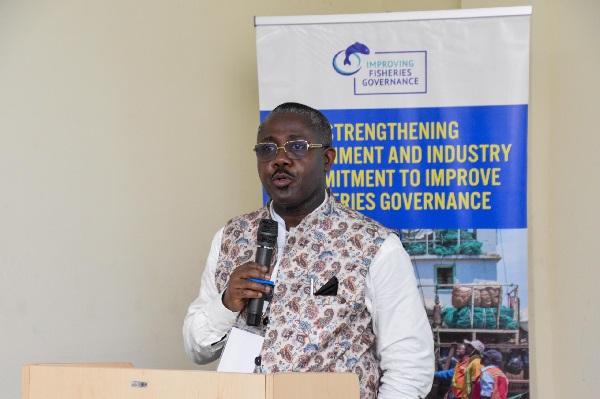
Professor Nunoo calls for joint management of shared fish stocks in West Africa
The Board Chairman of the Fisheries Commission of Ghana, Professor Francis Nunoo, has called for a collaborative approach to managing the shared fish stocks in the West African sub-region.
He believes that the coastal states must jointly manage these resources through shared responsibility to ensure sustainable fishing practices across the region.
Prof. Nunoo emphasised that it would be counterproductive for one coastal state to adopt sustainable fishing practices while others in the region do little or nothing to protect the shared fish stocks.
He pointed out that since the region shares these resources, efforts to protect them should be a collective responsibility, not solely on individual nations.
Prof. Nunoo made these remarks at a three-day West African regional fisheries conference held in Accra on October 21, 2024.
The event brought together stakeholders from coastal states including Ghana, Nigeria, Togo, Liberia, Côte d’Ivoire, and Benin, to discuss sustainable fisheries management.
The conference was organised on the theme, “Identification of approaches to extend IFG project activities to Fisheries Committee for the West Central Gulf of Guinea (FCWC) member states,” as part of the Improving Fisheries Governance (IFG) pilot project launched in Ghana in 2021.
The IFG project overview
The IFG project is a three-year initiative aimed at promoting sustainable fisheries across FCWC member states.
Since its launch in 2021, it has focused on Ghana as the pilot country, with the goal of extending successful practices to other nations in the region, including Benin, Côte d’Ivoire, Liberia, Nigeria, and Togo.
The project is implemented by five civil society organisations: Hen Mpoano, Friends of the Nation (FoN), the FCWC Secretariat, TM Tracking (TMT), and the Environmental Justice Foundation (EJF).
The current phase of the project, which is funded by Oceans 5 and the Oak Foundation, will conclude in December 2024.
Discussions are already underway to extend its activities to other FCWC member states based on the lessons learned in Ghana.
The key focus areas of the IFG project include enhancing transparency in the fisheries sector, enforcing fisheries laws, promoting collaborative management, and building the capacity of stakeholders to improve fisheries governance.
The need for broader collaboration
Prof. Nunoo commended the efforts of the FCWC member states, particularly their efforts to adopt a harmonised closed fishing season, which Ghana initiated in 2016.
However, he urged the countries not to limit their cooperation to closed seasons alone.
He highlighted other critical areas where collaboration could be strengthened, including legal frameworks, data sharing, and management practices.
Prof. Nunoo emphasised that the region needs aggressive collaboration to protect shared fisheries resources, noting that actions taken in one country inevitably affect others.
He called for a unified approach to fisheries management, stressing that each state's efforts should complement those of its neighbours.
Senior officials and leaders of Civil society Organisations from other fisheries bodies in the region echoed Prof. Nunoo's sentiments, agreeing that a collaborative approach is essential for the sustainable management of shared fish stocks.
Localised Ghana’s successes
Reflecting on the achievements of the IFG project, Prof. Nunoo encouraged FCWC member states to critically examine the factors behind Ghana’s successes in fisheries governance.
He urged them to adapt and implement those strategies that are feasible for their own countries, noting that while Ghana has made progress, not all of its methods will necessarily work for every country.
He underscored the importance of tailoring solutions to meet country-specific needs, stressing that localised approaches are crucial to ensuring the long-term success of sustainable fisheries management across the West African region.
